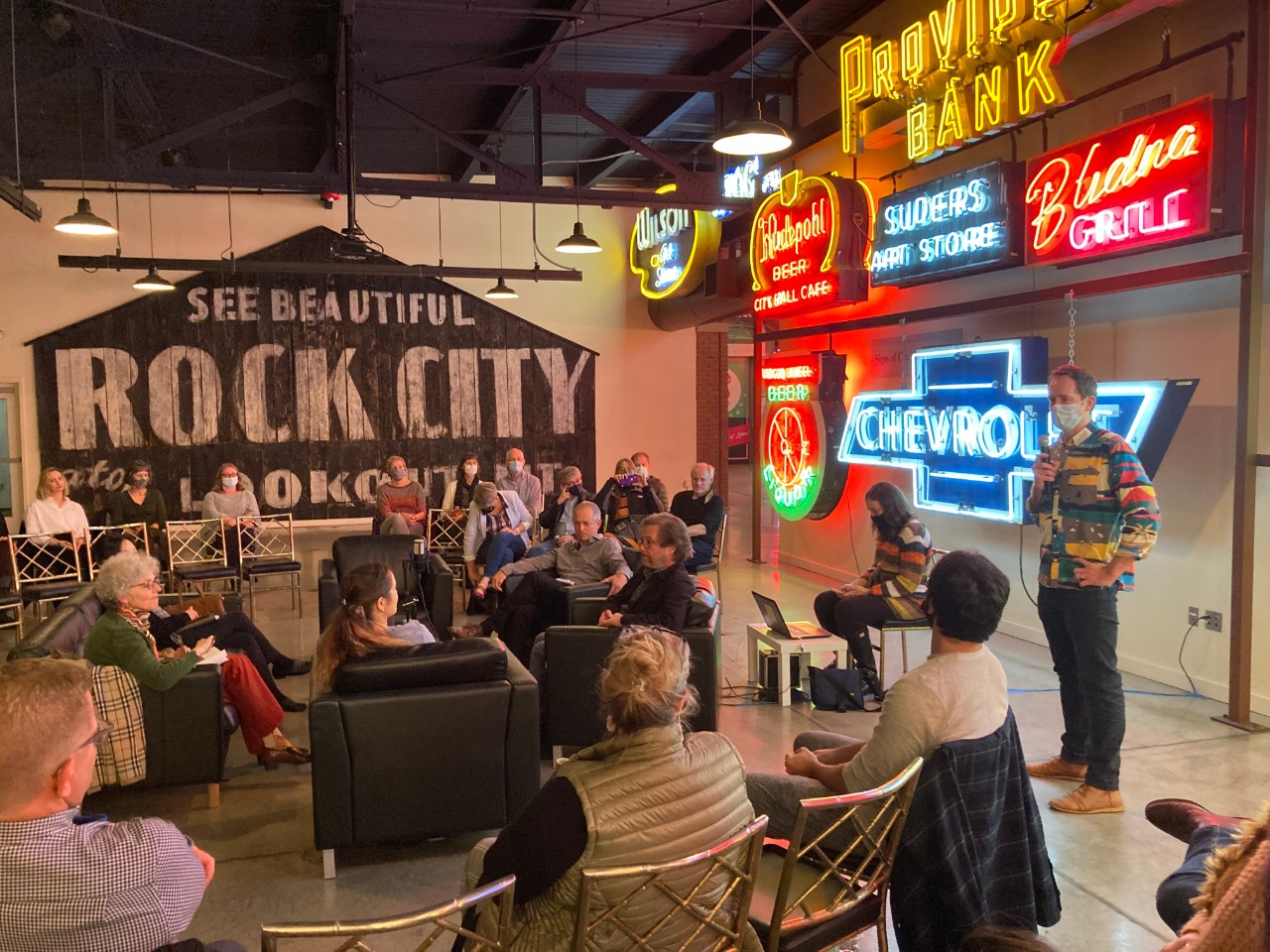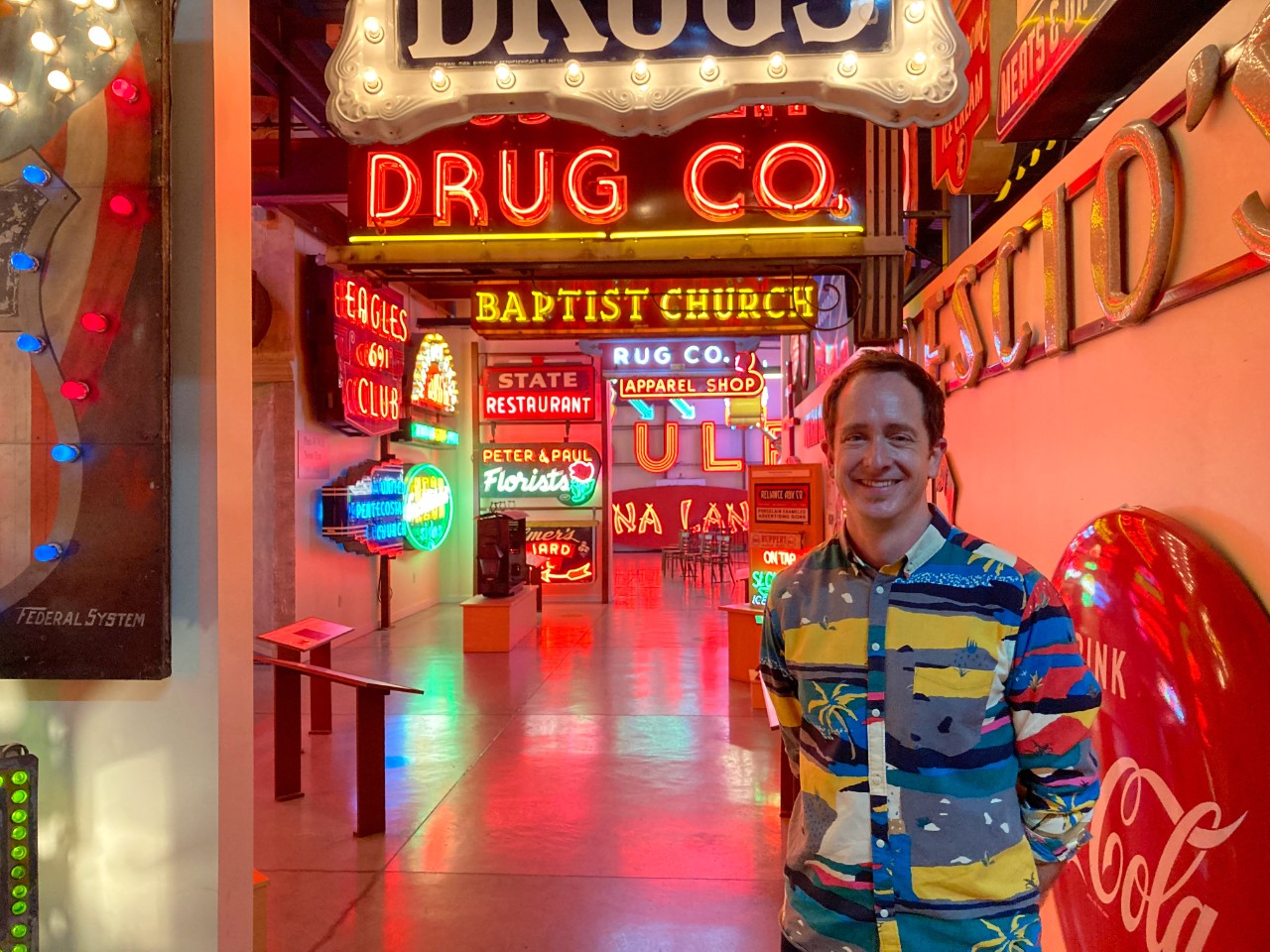
UC to host public talks on sensing
UC's new institute on sensing will explore how we perceive the world
What is a sensor?
The University of Cincinnati’s new institute for sensing research kicked off the first of eight public talks this school year with that simple question.
It sounds easy to define, but invited speakers to the UC Institute for Research in Sensing’s new Alloy Discussion Series quickly found room for debate during a roundtable discussion at the neon-filled American Sign Museum in Cincinnati. The institute will play host to 24 public discussions on various topics related to the senses over the next three years.
“The idea is to create collisions between perspectives, to throw sparks, to think about new ideas and be surprised,” said Nathan Morehouse, the institute’s director and an associate professor of biology in UC’s College of Arts and Sciences. He studies the perceptive abilities of spiders and other animals around the world.
It will host a second public talk on biomimicry and the future of sensing from 7:30 to 9 p.m. Nov. 18 at Lunken Airport’s Greater Cincinnati Airmen’s Club at 262 Wilmer Ave. A third talk on hallucinations and the nature of perception is scheduled for 7:30 p.m. Dec. 9 at Swing House, in the Camp Washington neighborhood of Cincinnati. The event is free but registration and proof of vaccination or a recent negative COVID-19 test is required.

UC's Institute for Research in Sensing kicked off its Alloy Discussion Series with a talk on sensors at the American Sign Museum. Photo/Michael Miller
For its first public talk, the institute invited four speakers: Joori Suh, an assistant professor of architecture and design in UC’s College of Design, Architecture, Art, and Planning; UC College of Arts and Sciences (A&S) historian Maura O’Connor and philosophy professor Tony Chemero; and Tamara Lorenz, who holds joint appointments in A&S and UC’s College of Engineering and Applied Science.
Moderator Peter Langland-Hassan, UC director of graduate studies who specializes in cognitive science, kicked off the night’s discussion about what constitutes a sensor. Most everyone agreed that the human eye is a sensor. But what about a mercury thermometer? A pair of binoculars? An almanac?
“An almanac doesn’t do anything to tell you about the environment,” said Lorenz, an assistant professor with appointments in psychology and mechanical and electrical engineering.
Soon the conversation led to whether the algorithms behind modern technology represent a sensor.
“I haven’t decided on this either. It’s messy,” philosophy professor Chemero said. “I’m not sold that a search engine is a sensor, but I do think face recognition software is a sensor. But an algorithm is behind both.”
The discussions invite public participation with comments and questions from members of the audience. The UC institute also livestreams the talks and invites questions from those who can’t attend in person.
“I’ve certainly enjoyed talking with you about it. I think my thoughts [about sensors] are more complex for having done it,” Langland-Hassan said.
The UC institute is a scientific collaboration of researchers in biology, engineering, chemistry and other departments from across the university. The institute launched a graduate training program this year with 16 doctoral students from nine departments in three UC colleges.
The institute also works with partners such as the Environmental Protection Agency, Kroger and Procter & Gamble Co. on research questions related to sensors and sensing.

UC associate professor Nathan Morehouse, director of UC's Institute for Research in Sensing, picked locations like the American Sign Museum for its discussion series on how we perceive the world. Photo/Michael Miller
Elite company
The board of UC’s Institute for Research in Sensing consists of researchers whose work touches on various aspects of sensing:
- Biology professor Elke Buschbeck has studied the visual systems of creatures like diving beetles in her lab in UC's College of Arts and Sciences. More recently, she has been experimenting with carbon nanotubes to understand neuroscience and electrochemical sensors.
- Tamara Lorenz, who holds a joint appointment in psychology and mechanical and electrical engineering at UC. Lorenz has examined ways to make collaborative industrial robots safer by studying workers’ behavior.
- Ryan White is an Ohio Eminent Scholar and professor of chemistry and electrical engineering. He is working on innovations in biosensors, among various other research interests.
- Nathan Morehouse, the director of the institute, is an associate professor of biology in UC’s College of Arts and Sciences. He used part of a $2 million National Science Foundation grant to study the vision of spiders around the world. Students in his Morehouse Lab continue to study visual systems in insects and spiders.
- Michelle McGowan is an associate professor of pediatrics in UC’s College of Medicine, where her recent work has touched on the lack of regulation in mobile health phone apps and how state laws address disparities in women’s health.
- Sunnie Rucker-Chang is an associate professor and director of European studies in UC’s College of Arts and Sciences. Her work investigates contemporary cultural movements and identity formation in Europe. She is co-editor and contributor to the 2022 book “Cultures of Mobility and Alterity: Crossing the Balkans and Beyond” and co-author of the 2020 book “Roma Rights and Civil Rights: A Transatlantic Comparison.”
Featured image: Nathan Morehouse makes introductory remarks to guest speakers gathered in a circle in front of the neon signs of the American Sign Museum. Photo by Michael Miller.
Impact Lives Here
The University of Cincinnati is leading public urban universities into a new era of innovation and impact. Our faculty, staff and students are saving lives, changing outcomes and bending the future in our city's direction. Next Lives Here.
Related Stories
UC celebrates Earth Day with greener, bolder moves
April 18, 2025
This year, UC’s Earth Day celebration honors a growing portfolio of eco-conscious achievements that stretch across the main and regional campuses. In a university-wide effort that bridges environmental science, design and community action, Bearcats are proving that green isn’t just a color — it’s a culture.
UC student receives renowned Truman Scholarship
April 18, 2025
Harshman Sihra, a reproductive health advocate planning a future as an OBGYN and public health policymaker, is now the third University of Cincinnati student to win the Harry S. Truman Scholarship.
Music as Medicine: World Voice Day shines a light on healing...
April 18, 2025
On April 16, 2025, voices filled Cincinnati Music Hall — not just with song, but with purpose, for World Voice Day: Music as Medicine — a vibrant celebration of the healing power of voice and music.
